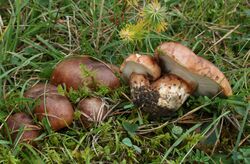Biology:Tricholoma fracticum
| Tricholoma fracticum | |
|---|---|

| |
| Scientific classification | |
| Domain: | Eukaryota |
| Kingdom: | Fungi |
| Division: | Basidiomycota |
| Class: | Agaricomycetes |
| Order: | Agaricales |
| Family: | Tricholomataceae |
| Genus: | Tricholoma |
| Species: | T. fracticum
|
| Binomial name | |
| Tricholoma fracticum (Britzelm.) Kreisel (1984)
| |
| Synonyms[1] | |
| Tricholoma fracticum | |
|---|---|
| Mycological characteristics | |
| gills on hymenium | |
| cap is convex | |
| hymenium is subdecurrent | |
| stipe has a ring | |
| spore print is white | |
| ecology is mycorrhizal | |
| edibility: inedible | |
Tricholoma fracticum is a sturdy mushroom of the agaric genus Tricholoma with a red-brown cap and a harshly bitter taste.[2] It is mycorrhizal with conifers, primarily of the genus Pinus,[2] and can be found in California.
Taxonomy
First described as Agaricus fracticus by German mycologist Max Britzelmayr in 1893,[3] it was transferred to the genus Tricholoma in 1984 by Hanns Kreisel.[4] Though it has been occasionally listed as a synonym of Tricholoma batschii, a European species, T. fracticum possesses larger spores and 2-spored basidia in contrast with T. batschii's 4-spored basidia,[5] and they are currently considered separate species.[1]
Description
Tricholoma fracticum is distinguishable with relative ease by noting the combination of a red-brown cap that becomes viscid (slimy) when wet, and a quickly disappearing partial veil that leaves a flimsy ring or sometimes only a delineation in stipe color up towards the gills. No other Tricholoma in California has both of these features.[5] Also worth noting is its sharp, bitter taste, which is always present in this species and distinguishes it from lookalikes such as Tricholoma aurantium, which has a blander, mealy taste. The cap is more or less smooth, with an initially inrolled margin, 3-10cm in diameter, broadly convex and flattening slightly in maturity. Gills are whitish, attached, and notched to subdecurrent. Stem sturdy, 2-8cm long, 1-2.5cm thick, whitish near apex, orange-brown below, with a flimsy but usually present ring. Flesh white, not bruising or changing upon exposure. Odor indistinct. Spore print white.[2]
See also
- List of North American Tricholoma
- List of Tricholoma species
References
- ↑ 1.0 1.1 1.2 1.3 "Tricholoma fracticum (Britzelm.) Kreisel :700, 1984". MycoBank. International Mycological Association. http://www.mycobank.org/BioloMICS.aspx?Table=Mycobank&Rec=192602&Fields=All.
- ↑ 2.0 2.1 2.2 Kuo, Michael (2006). "Tricholoma fracticum". https://www.mushroomexpert.com/tricholoma_fracticum.html.
- ↑ Britzelmayr M. (1893). "Materialien zur Beschreibung der Hymenomyceten 1" (in German). Botanisches Centralblatt 54 (2): 33–40.
- ↑ Kreisel H. (1984). "Beitrag zur Nomenklatur einiger Großpilze II" (in German). Feddes Repertorium Specierum Novarum Regni Vegetabilis 95 (9–10): 699–800. doi:10.1002/fedr.4910950919.
- ↑ 5.0 5.1 Shanks, Kristen (1994). A Systematic Study of Tricholoma in California. https://www.mykoweb.com/CAF/PDF/A%20Systematic%20Study%20of%20Tricholoma%20in%20CA.pdf. Retrieved January 19, 2022.
Wikidata ☰ Q10702809 entry
 |

